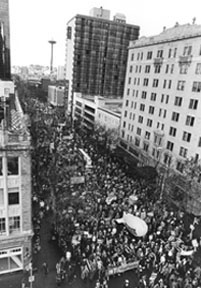|
Real
Free Trade
By Dean Baker
 |
|
Credit:
David Bacon
|
In the wake of the victory in Seattle, it is time for progressives to rethink attitudes toward trade. For too long we have allowed the other side to frame the agenda, including the language of the debate.
Starting at the beginning, this debate is not about the merits of free trade. The World Trade Organization agenda is very protectionist when it advances corporate interests. Specifically, extending copyright and patent protection to every corner of the globe has been a major issue before the WTO. While the WTO advocates donŐt speak of them in these terms, copyrights and patents are forms of protectionism. In a free market, anyone could freely reproduce copies of Microsoft Word or AZT and sell them to whomever they want.
Copyrights and patents are enormously costly forms of protection. Software that could be transferred at little or no cost can instead be sold for hundreds of dollars if it is subject to copyright protection. Patents often raise the price of drugs by several hundred or thousand percent compared with their free market price. In many cases, patents make lifesaving drugs altogether unaffordable for people in developing nations. By contrast, protection in the form of tariffs or quotas rarely raises the price of goods by more than 15 to 20 percent.
It also is no accident that only certain types of labor have been placed in competition in world markets. As a result of previous rounds of the WTO (and its predecessor, GATT), manufacturing workers in the United States are in direct competition with the cheapest labor anywhere in the world. This has been accomplished through years of drawn out negotiations that not only removed barriers to trade in goods, but also ensured the security of foreign investment, so that multinational corporations could feel safe building factories in developing nations. By contrast, there has been little or no effort to facilitate trade in professional services, such as medical care, legal services or accounting. While many professionals might like to imagine themselves winners in the global economy because of their talent and hard work, the reality is quite different: The game was rigged.
Dean Baker is co-director of the Center for Economic and Policy Research.
![]()
|
In These Times ©
1999
Vol. 24, No. 3 |
